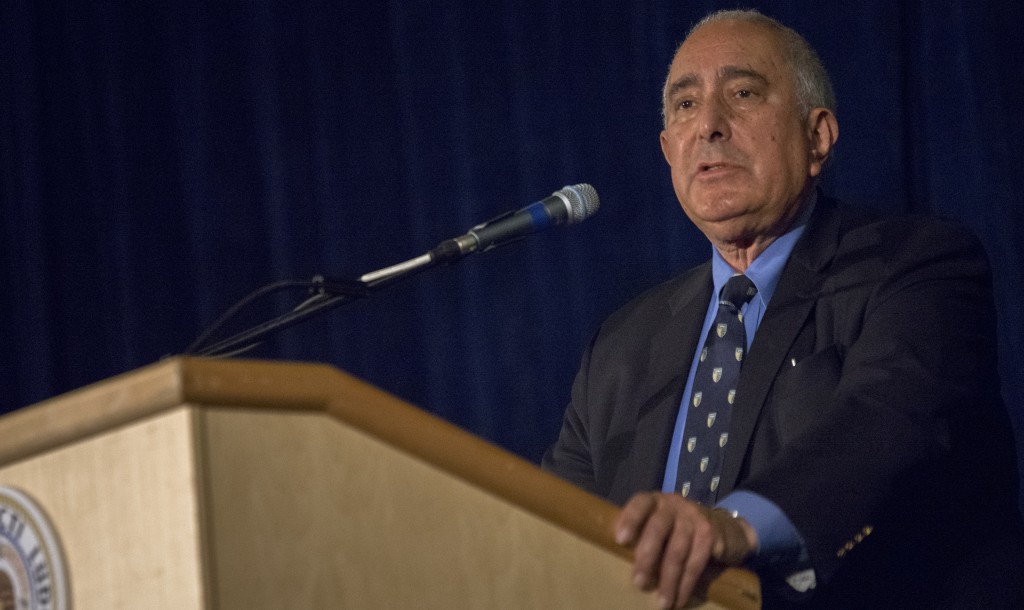Famed economist on millenials’ challenges

Stein: The celebrity and economist speaking in the Wool Ballrooms on Sept. 17.
The Great Issues Committee hosted Ben Stein in the Wool Ballrooms on Sept. 17, where the economist and celebrity gave his take on the United States “from the perspective of a 68 year old man.”
Stein described the situation of modern America as “unrecognizably better” than that of our country before the civil rights movement, or even during the Vietnam War.
He spoke at length about the violence blacks were subjected to and the opportunities minorities and women were denied in the late 1940s and the ‘50s, also detailing the injustices minorities faced in terms of political representation and access to education as well as the absence of women and black men in the political sphere and corporate America.
Further, Stein mentioned that the most prestigious colleges and universities even had limits on how many Catholics and Jews were allowed to attend. For Stein, the opportunities available to all American citizens are a far-cry from the civil issues of the past.
Turning from the improved social aspects of American life today, Stein talked about the housing improvements the U.S. has seen since the 20th century.
“You don’t know what life was like before air conditioning. It was hell,” Stein said to laughter, touching on the pleasures that modern American society tends to take for granted.
He also touched on the difference in our economy now compared to the 19th and 20th centuries.
According to Stein, America’s recent recession pales in comparison to the economic situation of the late 19th century and the Great Depression. He stated that the last part of the 19th century was “marked by continuous depression.” Further, during the “disaster of the 1930s” the U.S. saw an unemployment rate of 25 percent.
Having counted the American citizen’s modern-era blessings, Stein turned his attention to the nation’s present and future challenges. Focusing on federal policy, he talked about the tax and spending issues that congress has yet to resolve.
“It took the U.S. over 2 centuries to accumulate the amount of debt we are adding year by year from 2008 to 2011,” Stein said, calling attention to the government’s overabundant spending. He also criticized the Federal Reserve’s policy of buying U.S. debt, calling it a “gigantic Ponzi scheme” that wouldbecome a major burden to citizens in the coming years.
While he calls himself a Republican, he called for higher taxes on the rich and discounted the idea that lowering taxes would increase revenue as a failed Republican policy.
“We don’t want to tell rich people to go out and achieve and make money and then tell them that they’re horrible, bad people because they’re successful,” Stein said, “but it’s not right for [rich] people to pay such low taxes.”
Moving away from economics, he touched briefly on the issue of terrorism, lambasting the NSA, CIA and similar organizations for allowing clearance and permission to carry a gun in a top security facility to a man with a criminal record and a history of mental disorders.
Stein then spoke about the growing trend of single-family homes, which he called “the flight from responsibility.” Pointing to data for support, Stein argued that two parent households regardless of economic status are often more well adjusted and less likely to have issues with school or the justice system.
“It’s become the societal norm for men to knock up their women and run away from responsibility,” he said. “It is the greatest mass display of irresponsibility and cowardice in U.S. History.”
Stein stated that the single-parent problem has been more prevalent for black families and has in part led to a “nation within a nation of self-inflicted pain and lawlessness.”
Stein said that the current state of the K through 12 educational system isn’t up to par compared to many other countries.
“We cannot continue at this level of prosperity or even close with a collapsed educational system,” Stein said.
His final contention was the “stupefying materialism” of American culture.
Admitting that money has been a primary concern for society throughout all of history, Stein said America’s modern level of worship of material things has reached a harmful level.
“We treat our nation now as if it were an auction house and nothing has any value unless it attaches itself to something with a large amount of money,” Stein said. “It’s a false value.”
Instead he encouraged a dedication to service to others ahead of selfish intentions and materialism.





